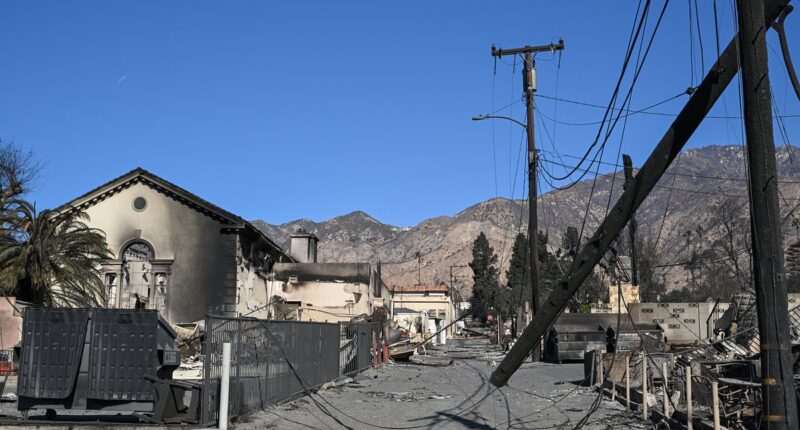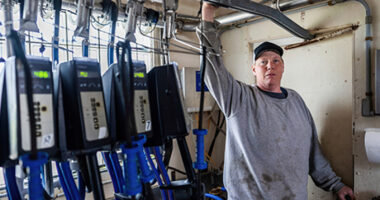Los Angelinos who have lost everything in the deadly fires have blasted insurance companies for denying people’s claims.
People are working hard to recover their expenses after over 12,300 buildings, including many homes and businesses, were completely destroyed by the fires.
However, they are facing a setback as major insurance companies are rejecting almost half of their claims in 2023, leaving them without the much-needed support, as reported by the LA Times.
A survey found the worst offender was LA-based Farmer Insurance, which denied around 50 percent of claims for payment.
Close behind were two USAA affiliates, who denied 48 percent of claims, and Allstate Insurance, which denied 46 percent of claims.
An example is Peggy Holter, an 83-year-old resident who lost her Pacific Palisades condominium, a place she called home since 1978, to the devastating fire that is tearing through the affluent area.
She now faces further turmoil after her insurer, State Farm, refused to renew her individual condo insurance, citing the condition of the roof.
Holter said she lost lots of personal items in the fire. ‘I’m not a big keeper of things, but what I did have was a whole wall of pictures and albums of all the places I had been, family photos,’ she told the LA Times.

Los Angelinos who have lost everything in the deadly fires have blasted insurance companies for denying people’s claims

Peggy Holter, 83, lost the Pacific Palisades condo she had lived in since 1978 in the horrific fire which is continuing to raze through the ritzy enclave
‘I had a picture of my mother on a camel when she was 52 in front of the Sphinx.
‘The only thing I am concerned about is the future, because that is what you have to do.’
Meanwhile, Pacific Palisades resident Francis Bischetti said the annual cost of the Farmers Insurance homeowners policy he subscribes to rocket from from $4,500 to $18,000.
The 55-year-old personal assistant said he couldn’t afford any of the insurance options, so when the home he lived in for almost his entire life burned ot the ground, he was left with nothing.
‘It was surrealistic,’ he told the LA Times. ‘I’ve grown up and lived here off and on for 50 years. I’ve never in my entire time here experienced this.’
State Farm said in 2023 that it would stop accepting new homeowners-insurance applications in California and then added last year that it would stop covering 72,000 homes across the state due to the growing frequency and severity of wildfires.
Comedic actor Rob Schneider ranted against State Farm last week, saying they were ‘a pile of crap for cancelling insurance policies’.
Actor James Woods, whose Pacific Palisades home was engulfed by flames and destroyed, also confirmed in a post that ‘one of the major insurance companies canceled all the policies in our neighborhood about four months ago’, an apparent reference to State Farm.
Even if residents are still covered by insurance, they could face a $115billion shortfall due to insurance companies likely only covering $20billion of the $135billion in estimated losses.

A fire fighting helicopter drops water as the Palisades fire grows
‘The concern isn’t whether insurance companies will pay out for damage but rather how much and how long it will take,’ Amy Bach, the executive director of United Policyholders, a California-based nonprofit consumer group, told NBC. ‘For the people who lose their homes in these wildfires, there will be fights over coverage.’
With losses surpassing $135 billion, according to a preliminary estimate by AccuWeather, the aftermath of this inferno is set to burden federal programs, strain insurance markets, and reshape the lives of Americans nationwide.
But only once the ashes settle will the true cost of the economic and social fallout become clear.
Insurance is expected to cover just $20 billion of the estimated losses, according to JPMorgan Chase. That leaves $115 billion in uncovered costs, setting the stage for a patchwork of federal aid, personal savings, and charitable contributions to fill the gap.
‘My concern is that the insurance companies won’t be able to handle all the claims and file for bankruptcy and that’s that. It’s scary,’ Los Angeles construction worker Ivan De La Torre, 32, whose uncle and sister both lost their houses in a fire that consumed half of Altadena, a suburb of some 40,000 people north of Los Angeles.
As hundreds of Los Angeles residents return to find homes reduced to ashes due to a devastating wave of wildfires, many are fearful that their insurance policies may not cover the rebuild cost and that future premiums will be astronomical.
The fire, which engulfed some of America’s wealthiest neighborhoods, has already left thousands scrambling for answers – and funds – to rebuild their lives.

















